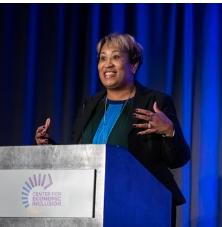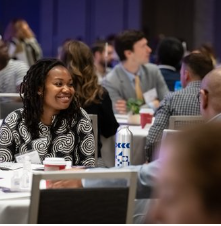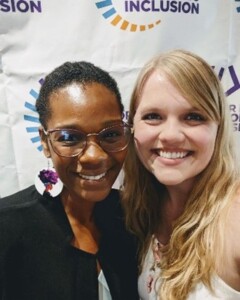Key Takeaways from the 2023 Powering Inclusion Summit
The Powering Inclusion Summit, hosted by the Center for Economic Inclusion, is a powerful day featuring hundreds of the leading changemakers who are building wealth and opportunity in housing, economic development, business growth, and more to build legacy wealth in Black, Indigenous, Latine and Asian communities. I was honored to attend the 2023 Summit on June 22nd with ChaQuana McEntyre of Family Rise Together, who I have always admired as a key leader in fostering economic inclusion here in Duluth.
 Two quotes stood out to me during the day. The first one was brought up by a panelist, who explained: “As an employee, you are told that it is everyone’s job to contribute to the financial health of the organization. Diversity, Equity, and Inclusion is no different—While some organizations may have a DEI Officer or Director, the truth is that it is everyone’s responsibility to further an organization’s DEI goals.”
Two quotes stood out to me during the day. The first one was brought up by a panelist, who explained: “As an employee, you are told that it is everyone’s job to contribute to the financial health of the organization. Diversity, Equity, and Inclusion is no different—While some organizations may have a DEI Officer or Director, the truth is that it is everyone’s responsibility to further an organization’s DEI goals.”
True change and transformation will never happen unless everyone in an organization contributes. Leadership must empower all staff members to think of DEI as something just as important to an organization’s overall health as finance—Not only is DEI the right thing to do, but studies also show that it leads to enhanced profitability, higher employee morale, and richer strategic decision-making.
The second quote that stood out to me was shared in a story about a board member who appeared resistant to DEI practices. When questioned, the board member replied: “I don’t want DEI to be something I do – I want it to be something I am.” This board member was feeling disenchanted with one-off initiatives and policies relating to DEI and wanted to do the hard, continuous work of making DEI a lived daily value. What if we all looked at Diversity, Equity, and Inclusion as an inherent value in ourselves as leaders, rather than simply something we do?
My first Activator Lab at the Summit was “Talent Pipelines, Management, and Culture Brokers for Racial Equity.”
Key takeaways included:
- Culture workshops, mentoring, and leadership engagement in the first 24 months of employment help ensure long-term retention and fit for new BIPOC employees
- Allies can use their privilege, power, and access to create change in the workplace
- Reporting diversity metrics keeps companies accountable
- BIPOC colleagues may be experiencing corporate culture for the first time; this is where mentorships matter most
- Embracing differences in the workplace—such as different ways of dressing, wearing one’s hair, or differences in speaking/communicating—is a powerful strategy for creating inclusion
 My second Activator Lab of the day was “Ownership for Wealth Building: Building Inclusive Economic Development, Community Development & Real Estate.”
My second Activator Lab of the day was “Ownership for Wealth Building: Building Inclusive Economic Development, Community Development & Real Estate.”
Key takeaways included:
- BIPOC entrepreneurs who own their commercial real estate are able to keep more money in their communities, as profits that would go to rent are instead reinvested in the business and local community
- A report by CitiGroup concluded that giving Black entrepreneurs fair and equitable access to business loans could have added $13 trillion in business revenue and potentially created 6.1 million jobs per year
- Larger cities have seen great success with property acquisition and strategic investment funds to help support BIPOC business owners in acquiring property
My third Activator Lab was “Master Class: Curated Spaces for Black & Brown Talent.”
Key takeaways included:
- Sponsorships & mentorships are critical in retaining BIPOC talent
- Employee Resource Groups (ERGs) and affinity groups are significant assets for businesses working to attract, retain, develop, and promote Black & Brown talent to customers
- Workers of color benefit from strategizing and designing business solutions in safe and brave spaces that honor their values
- ERGs and affinity groups create spaces for leadership development and coaching, career exploration, and relationship building of Black & Brown employees
- It is important to clearly articulate the role of White men and women in ERGs for racial & ethnic groups so that everyone understands the part they play within their organization’s DEI initiatives
- Five years after Coca Cola North America developed mentoring programs for professionals and mid-level managers, 80% of all mentees had been promoted at least 1 tier; 36% of participating employees identified as BIPOC
CEI concluded the Summit with this powerful goal: “By 2028, we will educate, equip, and influence 20,000 leaders, employers, and policy makers to make anti-racist actions to ensure that 3 million people experience a racially just, inclusive, and economically vibrant economy.” The Center will achieve this goal through the various services they offer, which include Educational Workshops, Data-Informed Tools such as the Racial Equity Dividends Index, Learning Tours, Peer Learning & Action Cohorts, the Project Vanguard Accelerator & Fund, Public Policy Sponsors & Advocates, and Transformation Consulting.
 So, the question at hand is: How can the Duluth Chamber incorporate these ideas into our DEI work?
So, the question at hand is: How can the Duluth Chamber incorporate these ideas into our DEI work?
The first step we have taken is engaging with the Center for Economic Inclusion consulting team to look into arranging a training for our Chamber staff. While the ideas presented at the Summit are encouraging and inspiring, they are often anchored in larger cities with more diversity, more capacity, and more nonprofits collaborating in equity work. We need to figure out how to realistically situate these inclusion strategies in the Duluth cultural landscape. For example, I believe there is tremendous opportunity for more intentional creation of safe spaces for BIPOC entrepreneurs in Duluth.
Let’s start with what is already being done. ChaQuana, under the umbrella of her nonprofit Family Rise Together, has developed a fantastic project called Building 117 that will provide spaces for BIPOC entrepreneurs to grow their business, interact with customers, network, and develop skills. In order to make this project a reality, our Duluth business community must uplift this effort to ensure the project acquires the necessary funding and collaborators to take flight. Our Duluth Chamber foundation has already partnered with ChaQuana in applying for grants to support this project. To learn more about how you can help Building 117 become a reality, reach out to ChaQuana at cmcentrye@familyrisetogether.org to begin the conversation.
With Building 117 on the horizon, what else can we do to create economic inclusion in our city? Could key employers collaborate to create a city-wide ERG group in Duluth where BIPOC employees can gather to network, share ideas, and engage in leadership development? Such a group would require a willing leader and organizer who is part of the represented community, but the Chamber would be happy to house the meetings in our conference room and provide administrative support for such an effort.
Or, is there a willing BIPOC leader who has the interest and drive to create and oversee a Twin Ports BIPOC Chamber of Commerce? Similar to how the Minnesota Black Chamber of Commerce shares space and memberships with the St. Paul Chamber, the Duluth Chamber would be happy to house a BIPOC-focused Chamber in our location and help with resources, cross-promotion, and technical support.
The Duluth Chamber also has opportunities internally that it must address—With the addition of the talents of Jebeh Edmunds to our team as Director of Education, we will soon be developing DEI statements for our Chamber, programs, and Board of Directors to keep our organization accountable and our goals transparent. We are critically examining and reimagining our Leadership Duluth and Fuse Duluth young professionals programs to ensure they are inclusive, welcoming, and accessible. We must also look at further strategies to enhance the diversity of our Board of Directors, our Chamber Ambassadors, our Fuse Leadership Council, and our membership as a whole. Everyone needs to have a seat at the table in order to achieve true economic inclusion. All of these opportunities are detailed on the Duluth Chamber’s DEI Action Plan that is currently in the final stages of development. We will update our website with our DEI statements and Action Plan once complete.
I look forward to continuing to share our progress as we engage with the Center for Economic Inclusion to meaningfully incorporate their inclusion strategies into our Chamber and our city as a whole. As Jebeh so wisely reminds us time and time again: “Diversity, equity, and inclusion is not a moment—It’s a movement.” If you are interested in joining us in this work, or feel your organization can help bring some of these ideas to life, please feel to reach out to me at ahagen@duluthchamber.com to begin the conversation.
Let’s power inclusion in Duluth—together.
